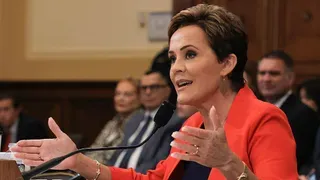March 4, 2012
Romney Wins Washington Caucuses, Focuses on Ohio
Michael K. Lavers READ TIME: 2 MIN.
WASHINGTON - Mitt Romney rolled to a double-digit victory in Washington state's Republican presidential caucuses Saturday night, his fourth campaign triumph in a row and a fresh show of strength in the run-up to 10 Super Tuesday contests.
Rick Santorum and Ron Paul battled for second place, while Newt Gingrich ran a distant fourth.
Romney said in a statement that his win meant Washington state's voters "do not want a Washington insider in the White House. They want a conservative businessman who understands the private sector and knows how to get the federal government out of the way so that the economy can once again grow vigorously. "
Romney's West Coast victory came on the heels of triumphs over Santorum earlier in the week in hard-fought Michigan and lightly contested Arizona, as well as a narrow win over Paul in Maine caucuses earlier in February.
Returns from caucuses in 54 percent of Washington state's precincts showed Romney with 38 percent of the vote, while Paul and Santorum each had 24 percent. Gingrich was drawing 8 percent.
There were 40 delegates at stake, and a likelihood that at least two of the contenders for the nomination to oppose President Barack Obama would add to their totals.
Romney, the former Massachusetts governor, had 173 delegates at the beginning of the day, according to an Associated Press count that includes party officials who will vote on the selection of a nominee but are not selected at primaries or caucuses. Santorum had 87, Gingrich 33 and Paul 20. It takes 1,144 delegates to win the nomination at the Republican National Convention this summer in Tampa.
Romney, Santorum and Gingrich were all campaigning in Ohio - the most intensely contested of the Super Tuesday states - as the first caucus returns were reported.
Romney criticized Obama after a woman attending a campaign rally said she had a daughter stationed in Afghanistan who believes the U.S. mission there is unclear. The woman asked when Romney would bring the troops home.
"If your daughter is not familiar with the mission that she's on, how in the world can the commander in chief sleep at night, knowing that we have soldiers in harm's way that don't know exactly, precisely, what it is that they're doing there," the former Massachusetts governor said.
He said he'd bring troops home "as soon as humanly possible - as soon as that mission is complete."
Santorum spent the day in Ohio, where he touted his plan to improve the nation's manufacturing base and said part of the effort must include a reduction in the number of children born out of wedlock. In Cincinnati, the former Pennsylvania senator said there's less freedom in neighborhoods "where there are no dads."
While polls show him in a close race with Romney in the state, it is not clear he can fully convert any success in the primary into delegate strength. There are 63 delegates at stake in Ohio, of which 48 will be allocated, three at a time, to the winners of the state's 16 congressional districts. Santorum has only 30 of the 48 delegate slots filled for those contests.
Based in Washington, D.C., Michael K. Lavers has appeared in the New York Times, BBC, WNYC, Huffington Post, Village Voice, Advocate and other mainstream and LGBT media outlets. He is an unapologetic political junkie who thoroughly enjoys living inside the Beltway.






